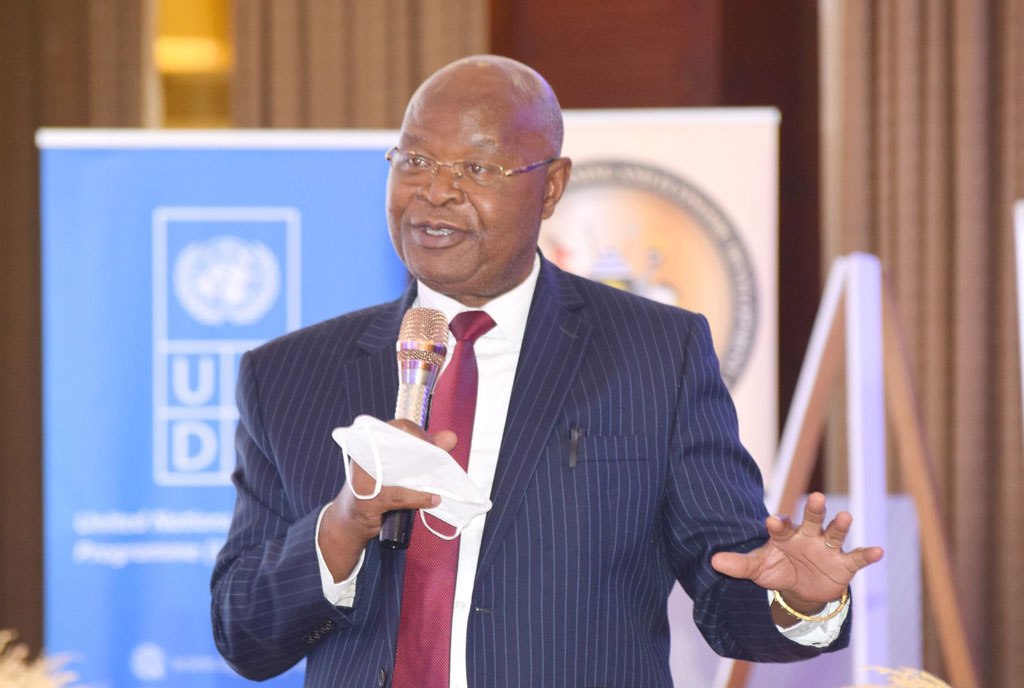Katakwi residents, livestock fight for water as dry spell bites

Efforts. Mr Richard Epel waters his animals at Angolekit borehole in Ongongoja Sub-county, Katakwi District, last year. PHOTO BY SIMON PETER EMWAMU
What you need to know:
Ms Anna Atim, a mother of a seven-month-old baby, says she has to push a bicycle for five kilometres from Angolekit Village in Angolekit Parish to access Oburatum borehole at least twice a day.
The boreholes yield no water. The valley dams built for livestock have dried up. In its path is cracked clay soil, burnt red by the scorching sun. The vast destruction of the heat wave is evident in wilted grass, leafless trees and dust storms triggered by whirlwinds.
Ongongoja Sub-county in the eastern Katakwi District has about 18,000 people. Previous water distress in the area prompted the government to provide 250 water tanks to families with permanent houses to harvest water.
It only worked during the rainy season. The area has received no rain for months, rendering farmlands barren and dry vegetation susceptible to wild fires.
The race for survival has birthed a secondary problem; social unrest. Villagers last week moved to kick out nomads, commonly called Balaalo, saying their cattle have become a menace in the wake of water scarcity.
The fight for water sources pits families against livestock owners.
Mr William Omeke, the sub-county chairperson, says of 28 boreholes, 17 have dried up. Of these, only 11 boreholes are for both human beings and livestock.
“Everywhere you go, people are staring at a water crisis. These are the complaints we receive daily at the sub-county,” he says.
Mr Omeke says the three valley dams that helped water hundreds of cattle are all complete parches of dry soil. Dams that have dried include those in Aumoi, Oroboi and Ongongoja parishes.
“The Balaalo are also seeking my attention on their plight with community but I can’t do much; their issues call for council resolution. The water crisis here is becoming political that I can’t take a sole decision,” he added.
The majority of the water taps from the valley dams, and boreholes scattered all over the sub-county’s eight parishes are empty.
Ms Anna Atim, a mother of a seven-month-old baby, says she has to push a bicycle for five kilometres from Angolekit Village in Angolekit Parish to access Oburatum borehole at least twice a day. “The queues at the borehole get unbearable that we have to struggle with cattle keepers who are also watering their animals at the same boreholes,” Ms Atim says.
“We are suffering; I struggle with the child on my back for long hours on the way yet it is baking hot [to ride] for long distances to have water for use at home,” she adds.
Mr Flibert Ocaon, the chairperson of the borehole user committee in Akouetom, says a fortnight ago, one Stella Rose Acom was bitten by a snake as she left home at 4am to collect water at Akouetom borehole.
“Imagine I have to come here as early as 4am to control crowds of people who storm this water point and go back home as late as 9pm. My meals are brought here because if I abscond, chances are that the locals [and] herdsmen struggling for water will break the water source,” he says.
Mr Ocaon adds that because of the water crisis, last Thursday, an ultimatum was given to all Balaalo to leave or find alternative sources where they will water their animals.
“These people came here with hundreds of cows; they in one way or the other caused our valley dams to dry up,” he says, without explaining how.
“We can’t tolerate them here; they should find their water elsewhere. They are even inconsiderate to our plight, they even go to the extent of driving animals into cassava gardens,” he explained.
Frustrated by the ultimatum given to them to leave, the Balaalo led by Stephen Tumusiime huddled up at the sub-county headquarters on Friday, seeking protection from the authorities against the charged locals who have denied them access to boreholes.
Balaalo protest
“We are here to tender our complaints to the LC3 chairperson and the sub-county chief. We are being treated unfairly and our herds have gone three days without water. The people at the boreholes are so hostile to us; they want us out of here,” Mr Tumusiime said.
The situation is dire, according to the sub-county chief, Mr Daniel Opio, and could have been worse had three new boreholes not been constructed last year.
“Of the 11 functional boreholes, seven are said to have been constructed by colonialists. The other three were sunk last year,” he says.
Ms Lydia Eseza Apio, the Katakwi District water officer, says the water crisis in Ongongoja is largely caused by its terrain.
“It is not true that Ongongoja has been neglected; we allocated four boreholes to Ongongoja last year, but almost everywhere we attempted to sink one, contractors never found water, even the ones that have little water dry up at this point in time because of the hard rock underground,” she adds.
Ms Apio says the ministry also came in with 250 water tanks but these are only functional during the rainy season.



